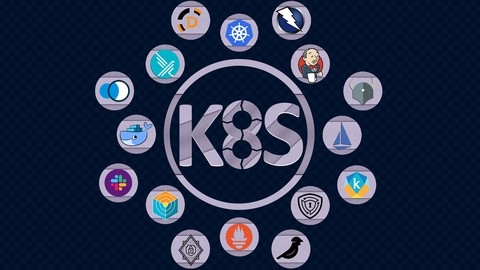Kubernetes security is crucial for protecting your containerized applications and infrastructure.
With the increasing reliance on Kubernetes in modern software development, ensuring the security of your clusters is paramount.
By learning Kubernetes security best practices, you can mitigate risks, prevent unauthorized access, and safeguard your valuable data.
This knowledge empowers you to build and maintain robust, secure, and resilient containerized environments, giving you a significant advantage in today’s competitive landscape.
Finding a top-notch Kubernetes security course on Udemy can be challenging, given the multitude of options available.
You’re searching for a course that not only covers the theoretical concepts but also provides practical, hands-on experience, enabling you to apply your newfound knowledge in real-world scenarios.
The ideal course should be comprehensive, up-to-date, and taught by experienced instructors who can guide you through the intricacies of Kubernetes security.
For the best Kubernetes security course overall on Udemy, we recommend the Certified Kubernetes Security Specialist course.
This comprehensive course provides in-depth coverage of key security concepts, including securing cluster components, managing user access, implementing network policies, and protecting your supply chain.
Its hands-on approach and focus on practical application make it an excellent choice for anyone looking to master Kubernetes security.
However, if this course doesn’t quite fit your needs, don’t worry!
We’ve explored a range of other excellent Kubernetes security courses on Udemy, catering to various learning styles and skill levels.
Keep reading to discover more options and find the perfect course to enhance your Kubernetes security expertise.
Certified Kubernetes Security Specialist
This course builds upon the Certified Kubernetes Administrator (CKA) knowledge, taking your skills to the next level.
You begin by building a secure Kubernetes cluster from the ground up, using industry-standard CIS Benchmarks.
This includes securing the core component ETCD with SSL/TLS encryption and client authentication, and configuring API server security with various authentication methods like X509 and OIDC.
You’ll learn how to harden your cluster using RBAC (Role-Based Access Control) to precisely manage user permissions, secure Ingress controllers for safe application exposure, and implement secure service account management.
You also learn how to upgrade your cluster without compromising security.
The course then guides you through minimizing vulnerabilities in your microservices.
You’ll master admission controllers like ImagePolicyWebhook and AlwaysPullImages, learn how to manage security contexts and work with privileged containers, and understand the importance of correctly using ImagePullPolicy.
The course also teaches you how to securely manage sensitive information using Kubernetes secrets.
You even get hands-on experience by hacking a misconfigured cluster to understand vulnerabilities firsthand.
You then move into system hardening, learning about container runtimes like containerd and runc, adhering to the OCI standards.
You’ll also explore AppArmor for enhanced security, delve into container runtime sandboxes like gVisor, and configure network policies.
You’ll learn how to use tools like Falco and Sysdig for runtime security and implement custom Falco rules for better monitoring.
The course then covers securing your supply chain by scanning container images for vulnerabilities and introduces you to static analysis techniques.
You’ll also delve into monitoring, logging, and runtime security using Falco and Sysdig.
Finally, you will learn about ensuring immutability at the container runtime level and properly setting up audit logs.
The course concludes with a dedicated exam preparation section, complete with practice tests, designed to help you confidently pass the Certified Kubernetes Security Specialist (CKS) exam.
Certified Kubernetes Security Specialist (CKS) for 2023
This CKS course isn’t for Kubernetes newbies.
You need some experience as a Kubernetes admin.
Having a CKA certification is a good idea, too, especially if you want to pass the CKS exam.
The course throws you right into the action.
You will work with a real, live Kubernetes cluster and face realistic situations.
Imagine having to stop intruders from getting into a Kubernetes cluster or keeping apps safe from attacks.
You will even learn how to create extra-tough images that are hard to crack.
You will also become familiar with essential security tools.
For example, you’ll learn to use NetworkPolicies to direct traffic within your cluster and RBAC (Role Based Access Control) to control which users can access what.
Get ready to roll up your sleeves and learn by doing.
You will start with the base camp of Kubernetes security - setting up a secure cluster.
You will learn how to use tools like NetworkPolicy and RBAC, the guardians of your cluster.
You will become skilled at controlling who gets in and who’s left out in the cold.
You will discover how to secure access to your cluster, say “no” to unwanted API requests, and even upgrade your Kubernetes version without breaking a sweat (or the system).
You’ll dive into the world of microservices, those tiny pieces of software that make up modern apps.
Think of it like learning to secure each ingredient of your favorite dish.
You will become familiar with Kubernetes secrets, the undercover agents of your cluster.
You will learn their language, understand how to protect them from prying eyes, and even explore hidden realms like container runtime sandboxes (gvisor and kata containers).
You will become a microservice security chef!
You will explore the intricate world of supply chain security, where you’ll learn to identify and neutralize threats before they even reach your doorstep.
Think of it as securing your supply lines to ensure that only the freshest, most trustworthy ingredients make it into your dish.
You will master techniques to shrink the attack surface of your container images, making them smaller and harder to hit.
Tools like Kubesec and Trivy will become your trusted allies, helping you scan for vulnerabilities and ensure that your images are squeaky clean.
DevSecOps - Kubernetes DevOps & Security with Hands-On Labs
This course takes you on a journey from DevOps fundamentals to advanced Kubernetes security.
You begin by exploring the difference between DevOps and DevSecOps, gaining a solid understanding of why security is paramount in today’s development landscape.
You then delve into essential tools like Jenkins for building CI/CD pipelines and Docker for containerizing applications.
Hands-on labs, using Azure virtual machines as your playground, provide practical experience, allowing you to build and push Docker images and deploy applications to Kubernetes clusters.
You then shift focus to security testing and analysis, learning how to write secure code with tools like Talisman.
You’ll use PIT for mutation testing and SonarQube to perform static code analysis, identifying vulnerabilities early in the development lifecycle.
You’ll also gain experience with vulnerability scanning, using tools like Dependency Check and Trivy to find and fix weaknesses in your applications and container images.
Finally, you’ll dive deep into securing your Kubernetes cluster.
You’ll learn how to use Kube-bench for security posture assessments and implement Istio, a service mesh, to enhance security between microservices.
You’ll explore monitoring tools like Prometheus and Grafana, learning to set up alerts and integrate them with AlertManager and Slack for real-time notifications.
You’ll also master Falco for threat detection and HashiCorp Vault to securely manage sensitive information like passwords and API keys.
Certified Kubernetes Security Specialist (CKS)
The Certified Kubernetes Security Specialist (CKS) course equips you with comprehensive knowledge and skills to secure Kubernetes environments.
You will start with securing the Kubernetes cluster itself using tools like Kube-Bench to harden the cluster and implement network policies to manage access between pods.
You will also learn how to secure node endpoints, verify Kubernetes platform binaries, and implement TLS with Ingress.
The CKS course then guides you through system hardening, including securing the host operating system and fortifying the container runtime environment.
You will become proficient in using AppArmor to safeguard your containers.
You will then delve into minimizing microservice vulnerabilities.
You will explore techniques such as managing container access with Security Contexts and implementing Pod Security Policies.
The course also demonstrates how to use OPA Gatekeeper to enforce resource validation policies effectively.
The CKS course emphasizes real-world application through practical exercises and a dedicated exam preparation section.
You will explore essential security concepts like supply chain and runtime security.
You will learn to minimize image attack surfaces, validate signed images, scan for vulnerabilities, and analyze container behavior using Falco.
The course provides valuable insights into monitoring and logging, including setting up audit logging for enhanced security.
Through this combination of theory and practical application, you will gain a thorough understanding of Kubernetes security and prepare to take the official CKS certification exam.




